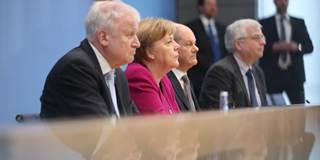Germany’s new grand coalition – the third in Merkel’s long chancellorship – is a good outcome for Germany’s short-term stability, especially with regard to Europe. But it is a bad outcome for democracy, especially at a time when populist forces are a growing threat.
BERLIN – More than five months after Germany’s federal election last September, a new grand coalition government – comprising Chancellor Angela Merkel’s Christian Democratic Union, the CDU’s Bavarian sister party, the Christian Social Union (CSU), and the Social Democratic Party (SPD) – has finally been formed. But there is little reason to celebrate.
Germany has endured nearly six of months under a caretaker government (the longest in the Federal Republic’s history), a failed coalition agreement, weeks of arduous negotiations, painful internal party rumblings, and much politicking. Moreover, a recent national poll dealt yet another blow to the center-left SPD, indicating that if elections were held today, the party would be outperformed by the far-right Alternative for Germany (AfD).
Add to that Europe’s ongoing right-wing backlash (exemplified, most recently, by Italy’s election) and the threat of a trade war with the United States, and Germany’s new grand coalition reeks of desperation. Not surprisingly, reactions to its formation were subdued, with the public and political insiders alike mostly just relieved to have the long ordeal behind them.

BERLIN – More than five months after Germany’s federal election last September, a new grand coalition government – comprising Chancellor Angela Merkel’s Christian Democratic Union, the CDU’s Bavarian sister party, the Christian Social Union (CSU), and the Social Democratic Party (SPD) – has finally been formed. But there is little reason to celebrate.
Germany has endured nearly six of months under a caretaker government (the longest in the Federal Republic’s history), a failed coalition agreement, weeks of arduous negotiations, painful internal party rumblings, and much politicking. Moreover, a recent national poll dealt yet another blow to the center-left SPD, indicating that if elections were held today, the party would be outperformed by the far-right Alternative for Germany (AfD).
Add to that Europe’s ongoing right-wing backlash (exemplified, most recently, by Italy’s election) and the threat of a trade war with the United States, and Germany’s new grand coalition reeks of desperation. Not surprisingly, reactions to its formation were subdued, with the public and political insiders alike mostly just relieved to have the long ordeal behind them.